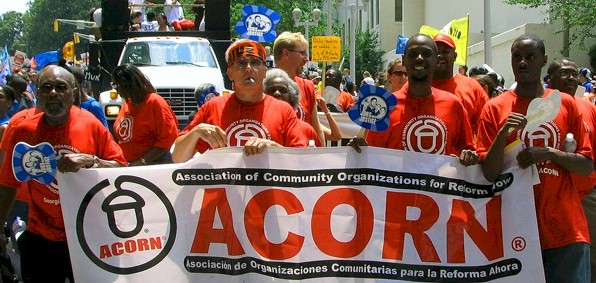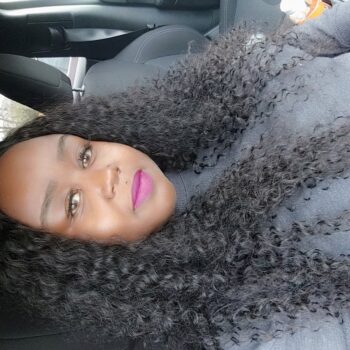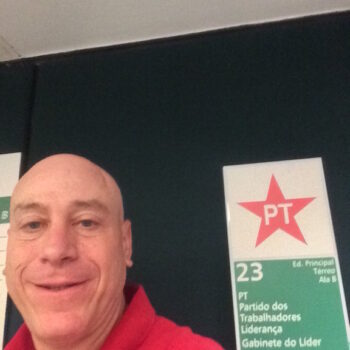It has been ten years since the community group ACORN was destroyed. At its height, The Association of Community Organizations for Reform Now was the largest community organization in the United States with chapters in over 100 cities. ACORN transformed homeownership for families of color, was a key player in raising minimum wages and registered almost three million voters in three election cycles, changing the electorate and helping Barack Obama win the Democratic nomination for President in 2008.
Both of us were proud to have worked many years in ACORN. As we continue our lives as organizers, here are 11 reflections from our years with the organization–one for each year since the organization’s demise–plus one for the New Year.
1) The members always know more than you
At ACORN we were taught to ask questions, never to think we knew the answers. Whether it was about what issues were most important to a community or what the message to the press should be, we knew that people most affected by the issue were the ones who could recognize the issue and campaign, co-conspire in the strategy, and talk about it much better than any organizer could. Members were the ones who picked you up after what seemed like a devastating loss. One of us remembers that the day after getting trounced by a three to one margin trying to raise the minimum wage in Houston, the leaders asking when we were going to do something like that again, noting how everyone in the city was talking about the minimum wage. Leaders’ common sense is what carried us through a million pieces of internal conflict. Our job as organizers was to provide a platform and plan for that knowledge and strategy. Members also defined the issues and decided the course of a campaign. One of the most successful neighborhood campaigns -Jeff-ever ran was focused on “Pizza Redlining.” Members who were running the campaign explained that the disparities between North and South St. Louis were so bad, that residents of North City could not even get a pizza delivered. Pizza delivery was emblematic of structural racism in St. Louis. That campaign, which came out of a leadership meeting, made national news.
2) Anyone can organize
ACORN believed that organizing was more a matter of will than one of skill, and that anyone had the potential to be able to organize. Not only that, but the organization gave new people a lot of responsibility. Often within their first month, organizers were responsible for an organizing drive, where they had to build or rebuild an ACORN chapter from scratch. The goal was to have 50 people join and 75 people come to a meeting that led immediately to an action. The meeting was all member-led. The organization believed that even new organizers could develop leaders, help cut issues, do large turnout and recruit large numbers of members, all within a two to three month span. Many more organizers failed than succeeded, but we gave people a real shot.
3) Organizers make lots of decisions every day, and that was encouraged
As an organizer, you have to make decisions every day. Do I ask this person to lead a piece of the meeting? What way do I challenge a new prospective member on their racism? For example, it happens among working class white folks in neighborhoods that are in transition that the older white homeowners think that an influx of immigrants, for example, is responsible for a decline in neighborhood conditions, rather than the responsibility of the powers-that-be. Confronted with such challenge, organizers need to redirect that conversation to one about power, while also gently challenging the individual about racist preconceptions.
Other decisions include, do I go the extra mile to make sure this person can attend the meeting? How many times should I return to this person’s house to see if they will join? We gave organizers agency to make all those decisions that are crucial. At the same time, we recognized the power the organizers wielded and tried our best to distinguish between organizers and leaders. If you got quoted in the paper as an organizer, you were supposed to buy lunch for everyone on staff. If you spoke at a meeting, it meant you had failed to sufficiently prep leaders. We acknowledged the power of organizers, and attempted to build up real leaders to counter that.
4) Within the membership, everything was on the table
The basic ACORN organizing rap talked about race and class as we polarized against the rich and powerful. Whether we talked about neighborhood issues or foreclosures or minimum wage, we talked about the rich and the white folks, who did not face the same problems and injustices. We never shied away from those conversations and oftentimes in mixed race neighborhoods, we let potential members talk about why they believed black folks or immigrants were ruining the neighborhood, while attempting to challenge them on their racist views.
5) Within the staff, conversations about race and class were taboo, at our own peril
Throughout most of ACORN’s existence, organizers made very little money and while only some came from privilege, there was an ethos among upper management that, until very late in our existence, presupposed that junior management had access to external resources. We created back-office systems that were weak and corrupt, and expected people who ran offices to be able to wait months for reimbursements of basic office expenses. Paychecks were often late. Many ACORN members did not want to come to work for us because it meant a significant pay cut. In the organization’s last years we monitored diversity more closely and attempted to change the internal demographics, but it was not easy; senior leadership was often very defensive when being challenged around race. Late in the organization’s history when we had an African American CEO, racist attacks from the Right were as vicious as ever. Old grudges in movement work take a long time to be put to rest, so regardless of our late progress on racial equity, movement allies were reluctant to come to our support.
6) We learned that organizing skills are applicable at all levels
With a few months experience you could be sent to run an office. That meant you got to figure out how to raise a budget, manage a physical office, do HR, figure out a communications strategy, run a mass voter registration program and much more. If you want to get press, it is much more important to have a relationship with reporters and do turnout calls than to have a super fancy press release. Maybe this very rapid escalation of responsibilities was too much–or maybe this is what the movement needs more of. These days we have specialized digital organizers, political operatives and communications staff. We would argue that our movement needs more generalists. ACORN’s first digital director got his start selling ads in an adbook and organizing first-time homebuyer fairs. He always said, you don’t call some people clipboard organizers, or phone organizers, so why is digital organizing so highly specialized? For a vibrant movement we need folks who have competency in or confidence to manage all the many parts of organizing work.
7) Not only did we need to know all the facets of the work, we also needed to be able to do what needed to be done
Need to get 20,000 valid signatures in 30 days to put a minimum wage initiative on the ballot with less than $15,000? Figure it out. Need to raise money to pay the staff, hit the doors? Canvass for it. Need to stop people’s gas from getting shut off? Block the trucks from leaving the gas company’s offices! Need to take a day off and go hang out with friends? Go do that too. When an assignment made sense, we took it. We got our leaders to work every single day on an issue. We asked poor people for money and they always delivered what we needed and more. We were able to build an internal culture that pushed, and with it came great risks, but also great rewards. Minimum wage victories in the states in 2004 and 2006 would never have happened without herculean efforts from staff and leaders. We would have never registered 3 million voters and been credited with winning or stealing the 2008 elections without doing what some folks thought was impossible. There is a lot to be said in favor of a culture that evaluates what is needed to get done and then goes out and makes it happen.
8) We fought to win
We (Jeff and Elyshya) both worked on the winning 2006 minimum wage campaign in Missouri. That campaign not only won a raise for hundreds of thousands of people, but it also became the single greatest reason that Claire McCaskill, a Democrat, beat an incumbent Republican Senator. Over and over again the organization would make an ambitious plan around an issue or campaign and then we made a plan to win. That plan involved hard work, sacrifice, scale and a range of tactics. Winning was not necessary to keep people’s spirits up; our members had been in the struggle longer than we had been alive. Winning was about making a plan, approaching it in a disciplined way, and defeating the powerful. Sometimes that was getting a big bank to come to the negotiating table. Sometimes that was about winning a statewide campaign. We saw wins as the way to grow, build our power and diminish the power of our adversaries.
9) Too much technique, without an ideological North star, was dangerous too
In the later years of ACORN, upper management began working with management consultants who had managed bankers. We started to do actions with the hope of monetary settlements; we had lost our way. In 2007-8, when the banks crashed the global economy, we were hard-pressed to really challenge them, because banks were a major funder of our work at a time when we were under vicious attack from the Right with tepid support from the center-left. We were always told we did not talk about ideology because those were the groups from the 1960s who pontificated rather than organize. But the lack of a clear analysis of racial capitalism, a racial justice analysis, and most importantly an orientation that would have always put us in the streets fighting global finance capital, made us less relevant than we should have been when we needed troops in the street fighting the banks.
10) We learned how to build real multiracial, multigenerational organizations
Some of the most powerful meetings took place in the context of kicking off a campaign where we did not initially have internal consensus. For example before we wholeheartedly endorsed a series of migrants’ rights proposals, we had a mass meeting where immigrant members, along with white and African American members got together. Immigrants told their stories and moved people around the urgency to support immigrants’ rights and local ACORN chapters adopted immigrants rights as a critical part of our agenda.
We had young members and older members. Our actions featured grandparents with their grandkids fearlessly holding space in the lobbies of the bank. One of the most powerful meetings one of us ever attended was a Board meeting in Houston, a fight about bilingual education, with African American members arguing strenuously that their kids needed to learn Spanish, while Latinx members arguing that English was the dominant language and needed to be learned fluently by all. Everyone learned from each other, had their preconceptions challenged as we strategized, argued and took to the streets together.
11) Always talk power
From the first time we knocked on a door we got to talk about power. Who runs the city? Why do the rich have everything they need and low income folks have nothing? What are the disparities in race? Almost all of us got to power-map our cities with our leaders. Who are the politicians accountable to? Who are the large corporations in town? What is the People’s agenda? We even learned how to follow the news and think about who got what story placed where. When we looked at campaigns we looked at power and leverage past just the politicians who we thought could deliver a win. We thought about power in our relationships with other organizations and that influenced with whom we built long-lasting alliances.
So many organizers of many stripes got their start at ACORN. We learned the rigor of one-on-one conversations. We learned to listen to the base about what issues to work on and how to talk about them. We tried our best to organize from the back, and let the most affected folks take the lead. We constantly thought about power and scale. We tried our best to be good movement players, whether it was engaging in massive voter registration in Indiana in 2008, or supporting a union scaling up an organizing drive.
We write this piece thinking about Mahaley Somerville, a long-time ACORN leader in Chicago who passed away a few years ago. Ms. Somerville thought we should have gotten on buses and headed to Florida in 2000 to not let the Republicans steal the election. We did not heed her and rather listened to the legal experts. With 2020 ahead and another stolen election in the balance, we hope we will listen and create a place where, as ACORN’s motto states, “The People Shall Rule.”


